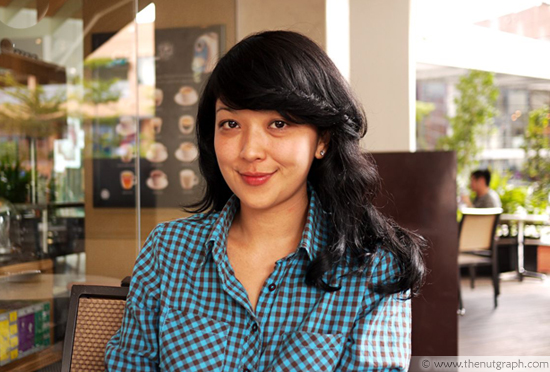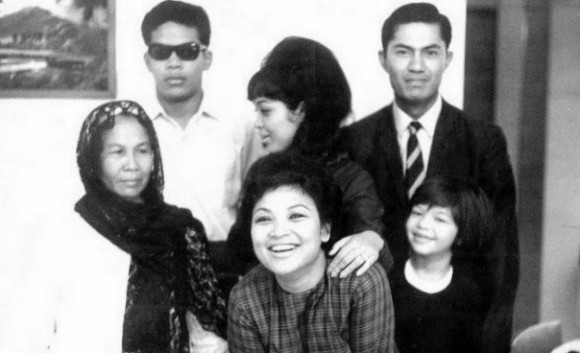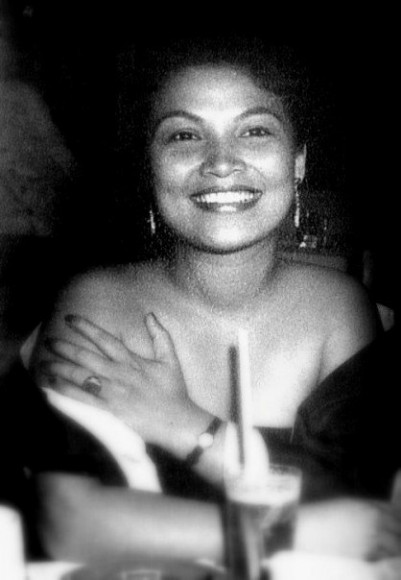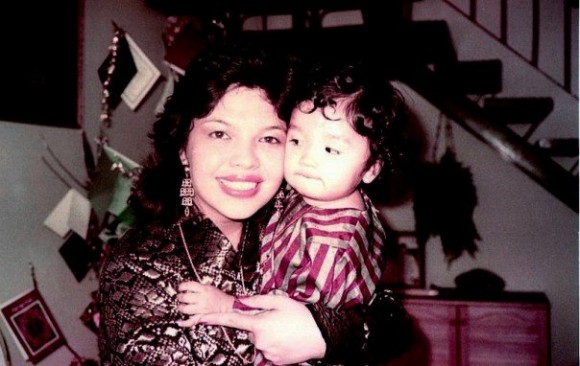Corrected on 12 May 2012, 11.15am

A SINGER-songwriter popular for her honey-like vocals and melodic tunes, Liyana Fizi has been in the Malaysian independent music scene since 2006. She first made her debut as one of the founding members of the indie pop band Estrella, which received eight nominations for the inaugural Voize Independent Music Awards in 2008.
Liyana has since become a solo artiste, releasing her debut solo album Between the Lines in September 2011. The album features 10 songs, including some the guitar-playing artiste composed herself. Indeed, Liyana says music is an important expression of her life and musings.
In an interview with The Nut Graph on 8 Feb 2012 in Bangsar, the songstress, who is of mixed ancestry, tells us why she feels it is important to keep on sharing stories, views and different opinions.
TNG: Where were you born? What do you remember from your childhood?
I was born in Hospital Kuala Lumpur on 14 Sept 1983. My earliest memory was in Brunei. I stayed there for a little while when I was three years old. But other than that, my childhood was spent in Shah Alam, and I still stay in the same house from when I was little.
Shah Alam was a nice place to grow up in because it is like a big neighbourhood. I stayed with my maternal grandparents and my mum. And you know how loving grandparents are. So I was very loved. It was awesome.
Can you trace your maternal grandparents’ roots?
Grandma was from Negri Sembilan and has Jakun, Jawa and Chinese blood, and grandpa was from Malacca. But my late grandpa was actually not my biological grandfather. Before him, my grandma was married to my biological grandfather, whose name was Peter Polderman, a Dutch [citizen] who was residing and working in Malaya at the time. But my grandpa raised my mother, and he raised me. So I don’t think blood is thicker than water, I really don’t.
As far as my family is concerned, we have strong “girl power” and adat perpatih tradition from the Negri Sembilan side. On my father’s side, he is from Kedah and has Siamese, Mamak, Arab lineage. So it’s all very rojak in my family.

What was it like growing up with this great mix?
Despite this great mix, I was raised as a Malay girl. I guess the benefit of having a family of mixed heritage would be that we are not inclined to judge people according to skin or religion.
Are there any memorable family stories or memories you hold on to?
My grandmother always had stories. What I realise is that people from the old days always have some sort of heirloom or beliefs. My grandma rocks; she is very sporting. She is the type of grandparent who wouldn’t mind if I wore bareback dresses or off-shoulder blouses. But she always said never to bare your midriff. It is the sexiest part of the woman and you cannot show it.
She is very wise, and her advice that will always stay with me would be: “If it is not yours, do not take it.” And: “If you have money, do not say you do not if someone wants to borrow some. Rezeki will always come back to you.” I think one of the most special pesanan I will always keep with me is “Take care of your mum”. She always said you belong to no one but God, yourself and your mum.
It is a really matrilineal family. You must have grown up with such a strong sense of your gender, and being a woman.
My grandma was schooled only up to Standard Two, and was stopped from going to school in case she learnt how to write surat cinta to boys. Then they married her off. Such an unfair situation.

However, she was very spirited. I was raised to know and understand my gender, not let it stop me from doing a lot of things. They also say Negri Sembilan women are very hard to control because they are garang and feisty!
Was race ever an issue to you?
It was never an issue as my family never likes to segregate. We are already so mixed! During Christmas, we had a tree because I always wanted a Christmas tree, but there were no trees for Hari Raya. So my mum would find a tree, spray it silver and put up Raya cards on it. It was a Raya tree! We would also dress up in saris and go visiting for Deepavali. Since I was a kid this was all the norm for me.
Do you feel you were one of the lucky ones?
Definitely, because I know some of my friends who have never been for a Chinese New Year or Deepavali celebration. They remain stuck inside their own bubble. They have this mindset that if they acknowledge or respect another religion’s celebration, they are betraying their own. But Islam promotes that you respect other people’s religion.
Obviously these days, there are controversies surrounding the issues of race and religion. How have they affected you?
I started realising these issues in college. My mum refused to send me to a local university because she did not want me to be in a bubble. She went to UiTM but she had a hard time there. Being half-Dutch, she stood out, and there were issues – she was not “Malay Malay”; her colour; she did not wear the tudung.
So I was sent to further my studies in a private college in Subang. I was bored in high school but in college I had a lot of fun. In certain classes – I had a class on Communications, Power and Conflict – we would study the Internal Security Act, Bumiputera rights and other topics. I was one of the three Malay [Malaysian] students in class, and lecturers would pose questions to get the discussion going. Some students would say they could not get certain things even though they had studied so hard. I was 19, and I was listening.
It was such an awakening because I realised how easy it was for me to get a loan. I remember thinking: “Shouldn’t it be a matter of looking at one’s background or grades for scholarships?”
And how did it make you feel?

It made me feel as if this privilege was put on my head. Some people say (the privilege) is a good thing, but there I was in class and others did not have this privilege. So how is this easy for me?
For people who are in my social network, I try to encourage them to open up their minds a little bit. I am not trying to preach or anything, but it is just to say certain things like: “Do not segregate.”
I once said “Happy Deepavali” online, and one kid said: “Someone said wishing Happy Deepavali is haram, awak kafir!” That pissed me off, which is very hard to do. So I gave him a piece of my mind, and the thing about posing these questions online is that you will get a lot of comments. Someone else will share links, some will say these are what different ustaz have said, and others will say you must respect different religions.
What else gets you or makes you unhappy about Malaysia?
Corruption. It’s very blatant. And the using of media to try and cover things. People can compare these days; it is not hard. What affects me is knowing that there are people who are not aware – the majority who are taking in everything on TV or in the papers and believing it. It affects me because if you are trying to shape the country this way, it is not going to go far. That gets to me.
What do you wish for the future?
I hope one day we will have free education and medical services for all citizens in this country. If we could get to that point, then things would progress in every aspect. That would be my dream.
And no tension over religion, because that is supposed to be personal and not governed. What gives me hope is that things are always progressing, and you have more and more young people who are willing to speak up. They have businesses and they are more outspoken. You know these old people who refuse to change? I keep thinking they will be replaced by these young people, these different youths of today. ![]()
The book Found in Malaysia Volume 2, which was launched on Malaysia Day 2011, is now available in bookstores for RM50. It features previously unpublished interviews with Asha Gill, Lillian Too, Khairy Jamaluddin and Baru Bian. Volume 1 of Found in Malaysia, featuring 54 earlier interviews, is currently in its second print run and retailing at RM45.


Liyana's fan says
She was born in 1983, the family photo above can’t be from the seventies as claimed. Cheers.
Jacqueline Ann Surin says
Thanks for pointing out that factual error despite our best efforts at fact and quote checking.
Will correct it soon.
Jacqueline Ann Surin
Editor
zulaikha says
Similar to Liyana, my grandmothers from melaka (of minang descent) were strong women with strong self worth. They married outside the race (one grandma married an Arab, another a Japanese, another an Indian, the list goes on) and nobody judged them to be less Malay.
S3 says
She is smokin’ HOT.
Ben says
Look at her mum! So gorgeous.
Ben says
I suddenly remembered when Whitney passed away, people on Facebook were like “RIP Whitney”, and some ustaz said (which people reshared), that wishing RIP to non-Muslims is “haram”. I was like, whut?
michael quay says
Simply like / respect your opinion about life, family and religion. Will be great if you can sing on weekends in Avillion Port Dickson. I guess it will cost the Resort a BOMB!?
Good luck in your future undertakings.
MQ